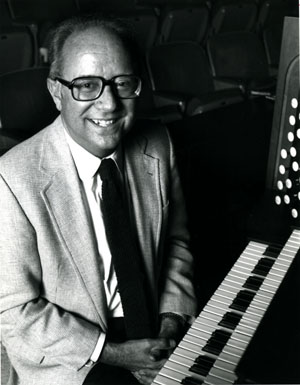Robert T. Anderson, SMU organ music pioneer, dies
Robert T. Anderson, who for more than three decades made Southern Methodist University one of the nation's foremost centers for training concert, academic and church organists, died Friday in Honolulu
By SCOTT CANTRELL
The Dallas Morning News
Robert T. Anderson, who for more than three decades made Southern Methodist University one of the nation's foremost centers for training concert, academic and church organists, died Friday in Honolulu. He was 74.
 Robert T. Anderson (Photo courtesy of SMU's DeGolyer Library) |
A small man with outsize energy and personality in his heyday, Dr. Anderson had suffered a long decline from Parkinson's disease. He moved to Honolulu in 2001 so his brother, Ron, could supervise his care.
"Robert Anderson, always a visionary and a leader, added immensely to the history of the study of the organ," said Gerre Hancock, professor of organ and sacred music at the University of Texas at Austin. "His dedication to the art of organ-building and organ-teaching will ever be a model."
Dr. Anderson was a professor and chair of the organ department at SMU's Meadows School of the Arts from 1960 to 1996. He was honored with the first Meadows Distinguished Professorship and the title University Professor, SMU's highest faculty honor.
A brilliant organist himself, Dr. Anderson performed all over the U.S. and Europe. In an age when organists increasingly specialized in certain repertories, he eagerly embraced great instruments and music of every time and place.
Dr. Anderson was one of the nation's most sought-after teachers, his students winning numerous national and international competitions and major academic and church positions. George Baker and Wolfgang Rübsam both won the prestigious Chartres Competition in France and have recorded extensively. Among many former students in the Dallas area are Mary Preston, organist of the Dallas Symphony Orchestra and organist-choirmaster of St. John's Episcopal Church; and Donald Krehbiel, artistic director of the Orpheus Chamber Singers and director of music at First Unitarian Church of Dallas.
"He could reduce you to tears in a lesson," Dr. Baker recalled. "But then he would lift you up and encourage you to give your best."
Very much the bon vivant, Dr. Anderson was a dapper dresser whose cars – from an enormous Oldsmobile convertible to a sporty red Cadillac – always made a statement. He was also a gourmet cook, and his laughter-filled parties were legendary. He relished introducing students from less sophisticated backgrounds to finer things in life.
"He introduced me to everything from French baroque music to the Four Last Songs of Strauss and Julia Child and Santa Fe and the love of traveling," said Dr. Christopher Anderson (no relation), a former student who is now associate professor of sacred music at SMU's Perkins School of Theology.
"RTA," as he was widely known, was the driving force behind many important new organs in the Dallas area, including the large C.B. Fisk instruments in the Meyerson Symphony Center and SMU's Caruth Auditorium.
Active in the American Guild of Organists, Dr. Anderson served on the organization's national council, as dean of the Dallas Chapter and program chair for two national AGO conventions held in Dallas. He also coordinated and chaired the jury for the first two Dallas International Organ Competitions, in 1997 and 2000.
A Chicago native, Dr. Anderson graduated from Illinois Wesleyan University and received master's and doctoral degrees in sacred music from Union Theological Seminary in New York. On a Fulbright Grant, he studied in Germany with Helmut Walcha.
Survivors include his brother, Ron Anderson, of Honolulu; his sister, Dorothy Faller, of Olmsted Falls, Ohio; a niece; and three nephews.
A memorial service will be held Wednesday at the Lutheran Church of Honolulu; interment will be in Chicago. SMU will hold a memorial service early in the fall term.
# # #